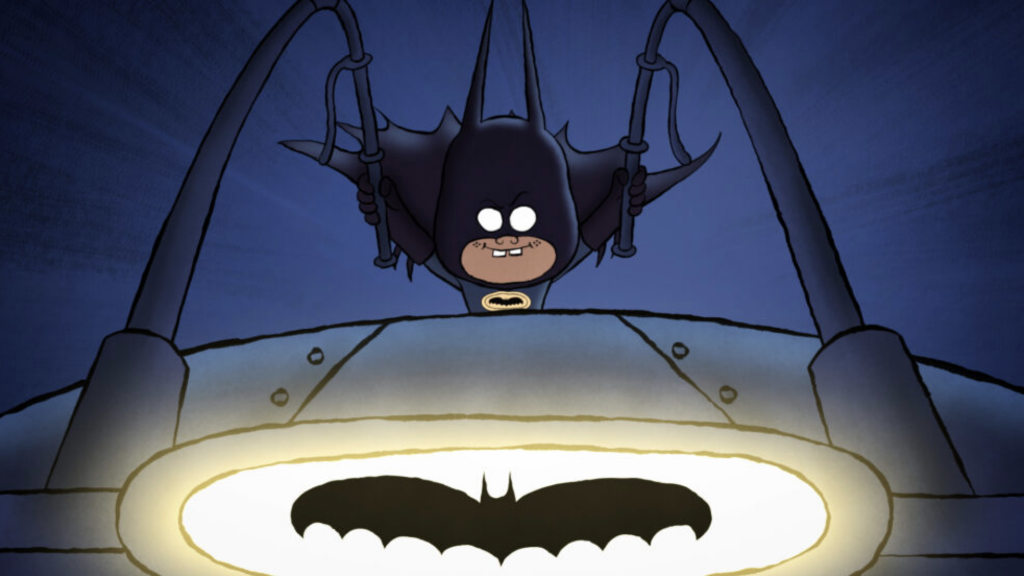Dream Scenario is a Nic Cage nocturnal fantasy devoid of meaning
At best, it’s an unfinished thought from a filmmaker who’s written himself into a corner. At worst, it’s a poorly argued diatribe against cancel culture that knows the punchlines, but doesn’t understand the jokes it’s telling.
Kristoffer Borgli’s new film Dream Scenario dares to ask the question, “What if Nicolas Cage showed up in everyone’s dreams?” To be more specific, it asks the question, “What if a bald, normcore Cage showed up in your dreams, but just kind of stood there?” Borgli’s surreal comedy has an intriguing concept at its core—an unexplained phenomenon causes a normal dude to become a featured player in nearly everyone’s nocturnal fantasies—and then ramps things up when said dude becomes an unwitting active, violent participant in the dreams of others. Whether Borgli has anything to offer beyond a high concept is another question.
Cage’s Paul Matthews is a professor at a small New England liberal arts college with unfulfilled ambitions and a relatively unremarkable (though not bad) life. That is, until his students—then other people in town, then random strangers all over the world—start to see him in their dreams. Paul doesn’t do anything in these dreams, but he is the common denominator, always standing there, observing.
Paul kind of enjoys his newfound celebrity, though his wife (Julianne Nicholson) is perturbed. Her concerns come home to roost when, without warning, Paul’s dream-state presence goes from benign to frightening to violent. As others’ dream-fear of Paul bleeds over into their real-life abhorrence of him, Paul’s own insecurities start to surface, and start to threaten his job, his family and his whole life.
Cage’s Paul feels a few steps removed from his Charlie Kaufman character in Adaptation; he’s snivelly, frustrated and ineffectual. He wants to leave a professional legacy, but lacks the drive to actually build one, which makes his dream stardom the perfect opportunity to finally snag some of the attention that’s always eluded him.
Part of what makes the idea of Dream Scenario so intriguing is that it considers what might happen if a situation like this happened not to not to someone conventionally attractive or immediately interesting, but to someone you wouldn’t really think about otherwise. Cage successfully digs deep into just how meh and slightly annoying a person like Paul might be, and that journey is fun to watch.
This being a movie about dreams, Borgli also has fun visualizing what’s going on in other people’s unconscious brains. When Paul’s students describe their dreams to him, they’re absurd, random and fleetingly disturbing—one boy is in a meadow, hiding from a maniac with a knife, as Paul just stands there staring into the middle distance. Late in the film (perhaps a little too late) we see what happens when capitalist entrepreneurs get their hands on Paul, and figure out how to turn his unexplainable ability into an advertising opportunity.
The problem comes when it’s time for Borgli to figure out how all of the dry jokes and cool ideas he’s come up cohere into an actual statement. When things go south, and Paul becomes a Freddy Kruegeresque agent of nightmares, he goes through a process familiar to anyone who’s watched a public figure go on an apology tour. He writes an apology letter that’s more about his victimhood. He tries to keep a low profile, but is shunned or quietly asked to leave whenever he’s recognized in public.
While we quickly point out the hypocrisy of actual public figures who’ve done wrong when this happens in real life, here Paul is in the right when he gets mad—he can’t help what happens in other people’s dreams, and he hasn’t done anything wrong. It’s difficult to tell what Borgli’s point is.
At best, it’s an unfinished thought from a filmmaker who’s written himself into a corner. At worst, it’s a poorly argued diatribe against cancel culture that knows the punchlines, but doesn’t understand the jokes it’s telling.
It’s worth noting that Dream Scenario is only the Norwegian Borgli’s fourth film, his second feature, and his first film in English. He’s got a visual sensibility and ambition that’s exciting to see from someone this early in their career. He’s also got early-career issues that feel more appropriate for someone making smaller independent films, not someone who’s got a flashy cast and the backing of Ari Aster and A24.
Dream Scenario is two fantastic acts that can’t seem to find a conclusion, and when your concept is this high, a conclusion (or at least a coherent point) is necessary.





